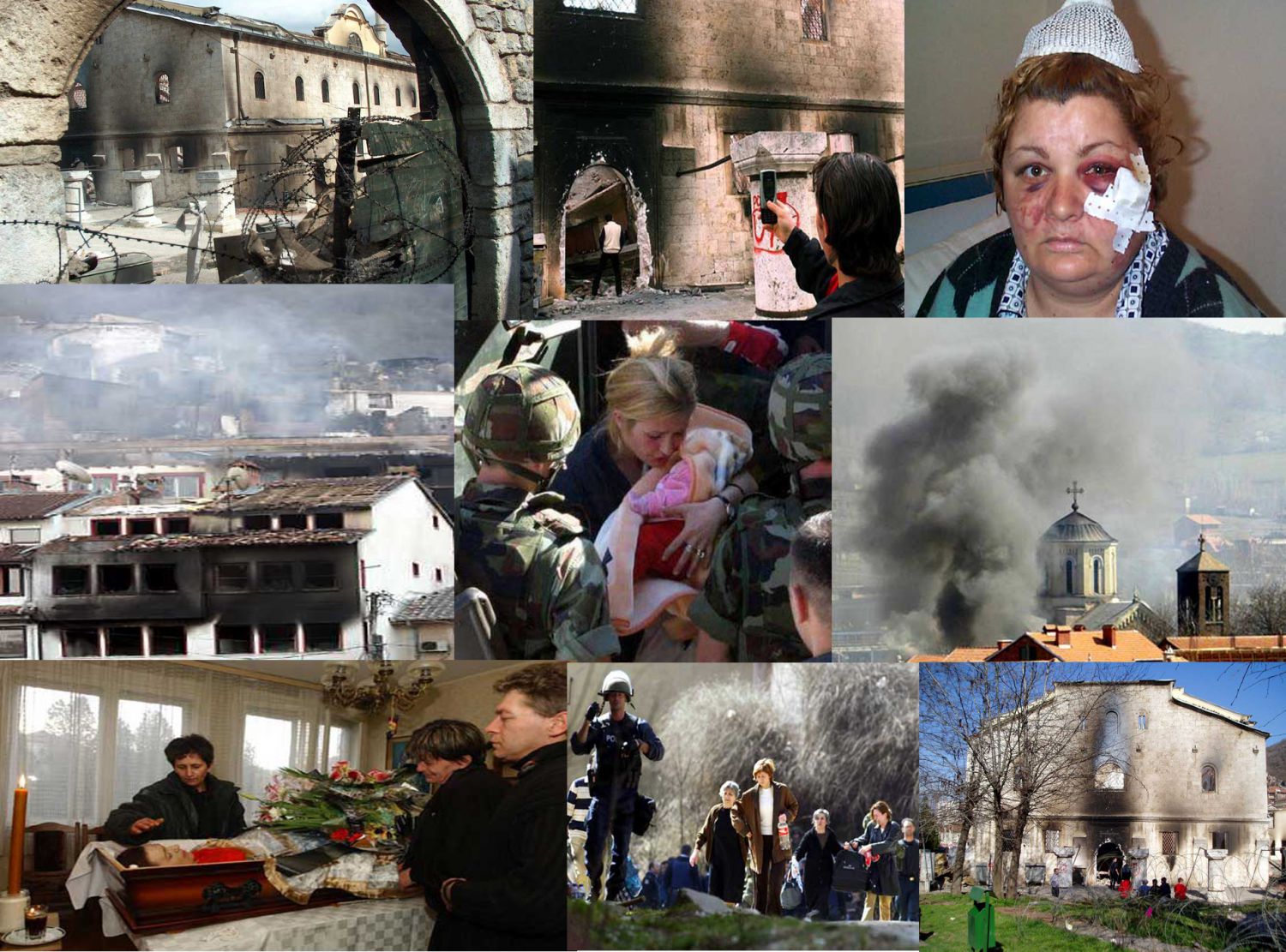Serbian Patriarch Porfirije visits Čurug
29. March 2022 - 9:23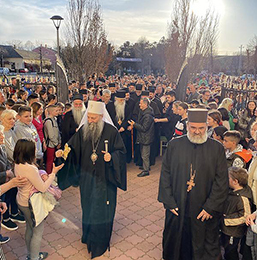
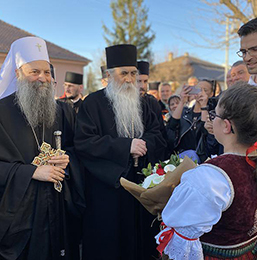 Patriarch Porfirije: Suffering in the experience of our Church is the experience of the Lord Christ. Suffering i.e. martyrdom, for that reason, above all, is the witness of truth about Christ as Son of God.
Patriarch Porfirije: Suffering in the experience of our Church is the experience of the Lord Christ. Suffering i.e. martyrdom, for that reason, above all, is the witness of truth about Christ as Son of God.
Monday, 15/28. March 2022, His Holiness Porfirije, the Serbian Patriarch, visited the Church of the Ascension of the Lord in Čurug. In front of the Church of the Ascension of the Lord in Čurug, Serbian Patriarch Porfirije and Their Graces Bishops Fotije of Zvornik-Tuzla and David of Kruševac, Bishop Irinej of Bačka with clergy and monastics of the Diocese of Bačka, as well as many faithful people.
Patriarch Porfirije with refugees from Ukraine (English, Greek, Russian)
22. March 2022 - 12:17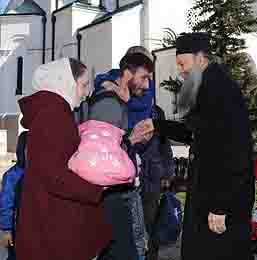
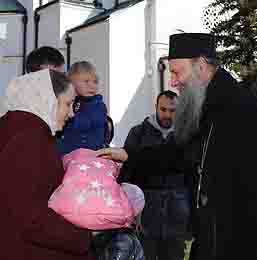 Today His Holiness Serbian Patriarch kyr Porfirije met with the family Geraschenko, which fled from Ukraine before the war fire, in the Parish house of Saint Sava church on Vračar.
Today His Holiness Serbian Patriarch kyr Porfirije met with the family Geraschenko, which fled from Ukraine before the war fire, in the Parish house of Saint Sava church on Vračar.
Alexander and Maria, whose fourth child was born just before leaving for exile, have temporarily settled with their godparents – the Nedeljković family. They pointed out that through Patriarch Porfirije they express gratitude to the Serbian people for the hospitality and shelter they have been offered. Patriarch Porfirije emphasized that our people knows very well how great is the sorrow caused by war, and especially what is the scope of suffering from being a refugee, as well as that the Church will do everything in her power to help Ukrainian refugees, but also to provide aid to the war-endangered area.
Patriarch Porfirije received Austrian Chancellor Nehammer (Englsih, Greek)
17. March 2022 - 15:34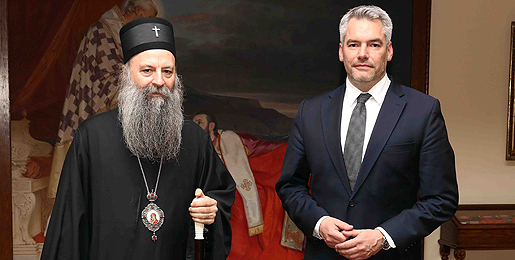 On 17 March 2022 His Holiness Serbian Patriarch kyr Porfirije received Mr. Karl Nehammer, Federal Chancellor of the Republic of Austria, at the Patriarchal Palace in Belgrade.
On 17 March 2022 His Holiness Serbian Patriarch kyr Porfirije received Mr. Karl Nehammer, Federal Chancellor of the Republic of Austria, at the Patriarchal Palace in Belgrade.
In a friendly and cordial conversation, His Holiness the Patriarch spoke with pleasure about the very good conditions in which the Serbian Orthodox Church functions in Austria and expressed gratitude to Chancellor Nehammer for that. Through the fact that hundreds of thousands of Orthodox Serbs live and work in Austria, the Patriarch emphasized the importance of preserving and improving the good relations between the Serbian and Austrian people, which will be given an important impetus by the meetings of Mr. Nehammer with the Serbian officials.
Anniversary of the March Pogrom in Kosovo and Metohia
17. March 2022 - 15:05- Pogrom on Kosovo and Metohia
- Распето Косово Crucified Kosovo - list of news
- #NoKosovoUnesco
Here you can also download the chapters of the book March Pogrom in Kosovo and Metohija, published in 2004 by the Ministry of Culture of the Government of the Republic of Serbia and the Museum in Pristina (with relocated headquarters):
- Fate of cultural heritage in Kosovo and Metohia= (pdf, 864KB)
- Religious objects and cultural properties destroyed in the March Pogrom (pdf, 3,48MB)
- Religious objects and cultural properties in Kosovo and Metohia in period between 1999 and 2004 (pdf, 3,41MB)
- Cultural Properties at Risk in Kosovo and Metohia (pdf, 4,63MB)
- Bibliography (pdf, 536KB)
It is 17 years since 4,012 Serbs were expelled from Kosovo and Metohia in destructive attacks by Albanian extremists, and most of them have not returned to their homes to this day.
In the wave of violence in Kosovo and Metohija, 19 people were killed then, eight of them Serbs, while 11 Albanians were killed in a clash with members of the international security forces. At least 170 Serbs were injured, as well as dozens of members of the international force who clashed with local Albanians protecting Serbs and their property. About 800 Serb houses were demolished and 35 religious buildings set on fire, including 18 cultural monuments, including the Church of Our Lady of Ljevis in Prizren.
This church, one of the most representative monuments of medieval Serbia, the episcopal center of the Serbian Church in the Middle Ages, received a monumental shape during the reign of King Milutin (1282-1321). The church was somewhat renovated, the first Liturgy was served in it six years later, but the traces of devastation and fire have not been removed. In 2006, the building was listed as a UNESCO World Heritage Site.
The extremists especially attacked the Serbian Orthodox shrines. 35 churches and monasteries were destroyed, and in these unprecedented acts of vandalism, some of which were broadcast live on local Kosovo television (such as in Podujevo), numerous icons and immovable cultural goods that survived the Ottoman occupation and world wars were destroyed forever. On March 17, 2004, the Serbian people and their Church were particularly affected by the fact that all this happened not during the chaos of war, but in the presence of thousands of members of the international peacekeeping force KFOR, Kosovo Police and the UNMIK, none of whom publicly claimed responsibility for a number of omissions.
The March events in Kosovo and Metohija were condemned by the UN Security Council, as well as the European Union, and the Parliamentary Assembly of the Council of Europe passed a resolution on April 29, 2004.
Serbian Patriarch kyr Porfirije had a conversation with Mr. Emanuele Giaufret, Head of the Delegation of the European Union (English, Greek, Russian)
15. March 2022 - 15:53On 15 March 2022 His Holiness Serbian Patriarch kyr Porfirije, together with members of the Holy Synod of Bishops: Their Graces Bishop of Srem kyr Vasilije and Bishop of Kruševac kyr David, as well as Bishop of Marča kyr Sava – head of the Cabinet of the Serbian Patriarch, received His Excellency Mr. Emanuele Giaufret, Head of the Delegation of the European Union to the Republic of Serbia, and his associates at the Patriarchal Palace in Belgrade.
A frank and honest conversation was about the current crisis, which shakes primarily the European continent and European nations, but also the entire world. The interlocutors agreed that churches, religious communities and their leaders can play a beneficial role today, for they are committed to peace, dialogue and tolerance, and have the opportunity to contribute to overcoming the great problems facing today's Europe.
On the Resolution of the European Parliament
14. March 2022 - 15:56The completely unjustified mentioning of the Serbian Orthodox Church in the Resolution of the European Parliament on foreign interference in all democratic processes in the European Union, including disinformation, based solely on deep historical prejudices and tendentiously created stereotypes is not surprising, but is, indeed, deeply disappointing for us.
Putting the Serbian Orthodox Church into the role of the cause of “tensions between ethnic groups in the Western Balkans in order to inflame conflicts and divide communities” is completely contrary to the facts and the commitment of the Church in everyday life, and we therefore firmly reject such a position.

